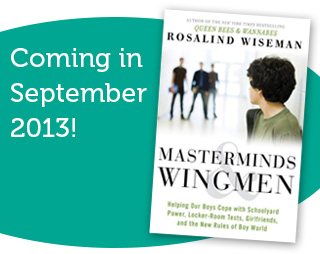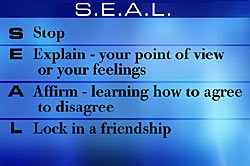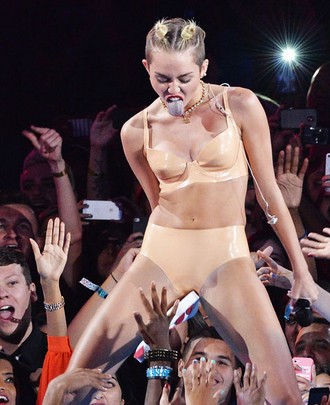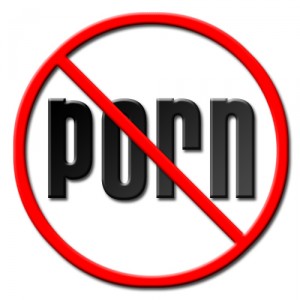 Aug. 30, 2013 There are certain overused terms pervasive in our media culture that jolt my critical thinking radar into high alert skepticism: ”parenting expert” is one of them, and “bullying prevention specialist” is another…And though author Rosalind Wiseman uses neither title, she’s one of the few that merits both monikers.
Aug. 30, 2013 There are certain overused terms pervasive in our media culture that jolt my critical thinking radar into high alert skepticism: ”parenting expert” is one of them, and “bullying prevention specialist” is another…And though author Rosalind Wiseman uses neither title, she’s one of the few that merits both monikers.
In her new book “Masterminds & Wingmen: Helping Our Boys Cope with Schoolyard Power, Locker-Room Tests, Girlfriends, and the New Rules of Boy World,” Rosalind Wiseman often deflects ‘the B word’ (bullying) in favor of terms like ‘abuse of power’…That’s refreshing, since bullying distortions abound and the word itself has become a contextually vapid catch-all phrase, not to mention a veritable ‘business model’ for prevention programs in themselves which may or may not “do much” in the problem-solving vs. lip-service realm.
In fact, one of my favorite critical thinking posts of hers, “What Makes A Good Bullying PSA?” takes a straightforward, helpful, point by point ‘try this not that’ style which echoes the candor and conventions of her new book. (which frankly should be distributed to every youth program provider in the nation who happens to be in an anti-bullying “let’s do something” mindset without evaluating efficacy).
In Masterminds & Wingmen, she takes a heartfelt and humorous approach to address the subtle nuances of relational aggression that float beneath the surface of boys’ “everything’s fine” game face, and gives no nonsense tips that parents can actually USE.
She gives parents a handy primer on how to uncork a conversation instead of bottle it up with boys, including watch-worthy “landmines” to ensure you don’t blow yourself up, and “check your baggage” warnings before traveling well-trod paths with personal patterns.
As a content partner and ally in ‘creating cultures of dignity,’ I was lucky enough to snag a galley proof of Masterminds & Wingmen before its release Sept. 10, 2013.
There’s also an accompanying ‘Guys Guide’ (a FREE, downloadable teen tips pdf) which was purposely created as an open access resource for boys to peruse and share directly, but I haven’t been privy to that yet. I’m curious about the tonality of the Guys Guide, and impressed by the freemium outreach, as it’s pivotal to engage as many guys in this convo directly, NOT via authority figures.
What makes this book on raising boys in today’s cultural context so different?
Getting inside boys’ heads and having it willingly committed to media documentation.
Boys speak out and speak freely. And it’s heart-wrenching, soul-sucking, gut-kicking candor that will snap your head around to not only contextualize the ‘blame game’ of pop culture’s media and marketing cues but alter perceptions, upend established tropes, and reframe the conversation from a different lens.
Regular readers over the years know I’m not a big fan of the “parenting experts” genre, as they often involve insipid over-generalizations, judgmental shoulds or theoretical playbooks…so this is where Masterminds & Wingmen “had me at hello” by going right to the teens for context…And upending several stereotypes about boys along the way.
She recruited a couple of hundred middle and high school teen boys all over the country to be her eyes, ears, and editorial sounding board, which puts this new book about what boys are really thinking in a different bracket of interest. (though the media literacy researcher in me would like to see the socio-economic/demographic-regional stats too)
One example of many insights threaded throughout the book?
Boys’ talk about their intimate emotions within relationships (with parents, with girls, with each other!) as she shared in this excerpt in her latest Family Circle column, Can boys and girls be ‘just friends?’
Throughout the book, she nails parents for their complicity in perpetuating some of the stereotypes surrounding boys’ behavior. It’s wisdom that needs shared widely. Listen up, parents:
“What do boys want from us? They want us to stop probing them with questions that come across as if we think all they want from girls is to get it on. That’s true whether they’re in 4th grade and we’re teasing them about who they have a crush on or they’re in high school and we’re assuming that their real motivation for having close female friends is sex…” –RW, Family Circle”
On the other end of the spectrum? Boy culture and porn.
Carl, 16: “Your email made me laugh, because it is a topic so right field that I never expected you to send me something like this. It’s also funny because it’s actually true. I’ve always thought of it as a “I can’t get any so why not watch this” kinda thing. But now I realize how it skews the thoughts of people who watch, and like everything else, it’s troubling and successfully doing its job.”
Rosalind Wiseman is at her strongest when she taps into a “you are there” element that sometimes feels like the dialogue is overheard, drawing from her bounty of teen boys as editors, with some of it even plucked from her own two sons’ antics, as if you’re eavesdropping from the living room couch.
She spares us the moralizing judgment in our sex-saturated culture, acknowledging straight away that 90% of kids between 8-16 have seen pornography and that no ‘filter’ is going to block every portal to the Internet.
(And hey, let’s be real, with the latest VMA Miley minstrel show pervasively dominating media, you don’t even have to ‘click’ to find pornification and racial degradation landing in a TV-14 time slot. Solid deconstruction on how that’s landing on kids, and a part two here) Rosalind writes:
“It upsets me that pornography gives our girls and boys unrealistic and often very unhealthy messages about sexuality that will influence them to some degree…It’s MORE annoying that as parents we have to deal with the fact that our children can have totally appropriate questions about sex, will naturally seek out the answers from these amazing tools we have, and then in two seconds are seeing things that they are not mature enough to process. But this is our reality.” –RW
I’ll say. Parenting in a “can you top this” media world at the intersection of raunch and racism is challenging to say the least.
As we’ve repeatedly conveyed in the “Brave Girls Want: To Take Back Media” campaign, pursuing the almighty greenback with zero accountability for how this mind pollution is splattering on even the youngest kids in the blast zone is sexploitation of the highest order.
Rosalind Wiseman is right…”this is our reality”…But her new book (and our Brave Girls Want campaign) helps position the “So what are we gonna do about it?” dialogue.
She drops some tried and true data nuggets about the need for accurate information as an antithesis to the tweaked media zeitgeist view of sexuality, imparting a guilt-free calm approach:
“…Nothing wrong with being curious about sex but the porn is disrespectful to women, involving upsetting/unhealthy messages about sexuality, talk to me or your dad, etc.” Just as I start thinking ‘blah-de-blah, standard fare sound bite,’ she flips the message and really shines, sharing her 10 and 12 year old boys’ own “deleted cached history” discoveries…
That’s when her first-person candor gets hilarious…and helpful.
Her response at first seemed like a well-stated, logical and measured mom-ified explanation of porn fakery:
“Porn is to sex like the WWE is to fighting…”
…”It’s a performance where women are supposed to look a certain way and to always like whatever the guy wants to do and the guy never cares about the woman he’s with…”
“It brings you into a complicated world where you’re being exposed to really messed-up images and messages about how men and women interact sexually.”
Exasperated after a repeat incident a mere two days later, she decided to dole out a slightly less calm rendition, which I found to be age-appropriately brilliant, working even better with a useful, head-turning, cause/effect consequence:
“Okay boys, I’m not going to ask you who was looking at naked pictures. But those sites are notorious for bringing viruses into computers…You know if that happens, our computers could stop working (the implicit threat the Xbox wouldn’t function).”
…It’s also possible that they could have ‘bots’ that could search my emails and files to get our financial information. Then, whoever the hacker is could take our money or use our identities to steal things.” She ended that paragraph with, “Judging from how big their eyes were, I had their full attention…”
For any parent who’s walked into a teen’s room as they’re finishing up 50 Shades of Grey or perusing online gyrations of ‘bare naked ladies’ (no, not the band) it’s comforting to see that even ‘experts’ are still balancing on the edges of calm and kerfluffled to impart a measured reaction.
With her young ‘tweens’ I love how she leapfrogged from sharing thoughtful, pensive parenting rhetoric to go for the media Xbox logic and just get the dang job done…Boom! That’s useful.
Granted, the NIMBY approach could easily be derailed at the nearest neighbor’s house, but a parent who has expressed a boundary both philosophically and pragmatically has done a rock solid job of conveying where they stand (and why). Speaking of rocks…
 “The Rock” is what Wiseman deems the aspirational parent profile, for “being the one who can influence a son’s actions when not physically present because the boy hears The Rock’s voice in his head.”
“The Rock” is what Wiseman deems the aspirational parent profile, for “being the one who can influence a son’s actions when not physically present because the boy hears The Rock’s voice in his head.”
The label-laden snapshots in the “parenting profile” section of the book are cringe-worthy in their ability to evoke sheer terror as one scans the list hoping for no recognizable form of themselves yet sees a little bit in each and every descriptor..
…Believer Parents, Bear Parents, Dictators, Pushovers, No-Excuses parents as well as the, Boys Will Be Boys, No-Privacy, Glory-Seeker, Don’t Ask-Don’t Tell, Bro Dad & The Girlfriend, Peace Vigilante and The Rock parenting styles. I’m not a big label fan, but think I’ve met, hosted, or been one of these ‘personalities’ at a given point in time.
What can readers expect with Masterminds & Wingmen?
Honesty, humor, and some thoughtful reflections from teens who “tell it.” Boys AND girls share accurate portrayals of ‘boy code’ conflicts and relational aggression with dialogue that doesn’t sound like it popped out of the mouth of an adult academic. (Boys talk about what they REALLY think about their experiences with ‘girl world,’ —how they interact, deflect, bury, or bounceback from some of the verbiage tossed their way…especially when it comes from parents and peers! And girls call them out on the peer dynamics of how they change into ‘sexist asses’ around their friends at times while they’re gentlemen one on one.)
 There are some helpful youth culture definitions, as well as a coinage or two that jarred me out of the prose, like the “ALMB” (Act Like A Man Box) which was threaded throughout the book (and is even more threaded throughout our culture).
There are some helpful youth culture definitions, as well as a coinage or two that jarred me out of the prose, like the “ALMB” (Act Like A Man Box) which was threaded throughout the book (and is even more threaded throughout our culture).
I ‘get it’ as shorthand for pigeon-holing boys, but it didn’t quite roll off the tongue as easily as her prior “SEAL” tool (at left) which I’ve replicated in my own relationship dynamics many a time, adults and kids alike. I’d always end up flipping to the front of the book mumbling, “Wait, what did that stand for again?” (More on SEAL in part two)
Certain slang DID stick in my mental relay, like the descriptive “lax bros” and “fruit cup girls”…And admittedly, even though I squirmed at the “Mastermind and His Minions” framing of the roles guys play in the social structure (Mastermind, Associate, Bouncer, Entertainer, Fly, Conscience, Punching Bag, Champion)…the boy-created labels served as an ongoing reminder that though it may feel frustratingly reductive, it’s also representative of their reality.
Again, the fact that the compilation of feedback comes from BOYS directly with the author facilitating, contextualizing and reporting is what makes this book eye-opening.
Style-wise, it’s an approachable, non-stuffy read, bringing relevance to daily parenting.
“Since we’re talking about sluts and whores,” Wiseman matter-of-factly writes, “let’s take a moment to address the “it’s-just-what-we-say-it-doesn’t-matter” defense that both guys and girls use…” She goes on to trounce the notion, expanding the dialogue to include verbal slurs on race, sexuality, physical impairment and beyond, and frame ways to get through to kids on this.
She uses first-person anecdotes well, like her visceral, intense feeling of betrayal when her (then 8 year old) son ‘tried on sexism’ saying, “Be quiet, woman” in a ‘half-mocking, joking, let-me-see-what-kind-of-reaction-I-can-get-from-my-mom-now tone of voice.
I love that phrase, “trying on sexism” because it accurately portrays the mimicking of ambient environments kids are exposed to 24/7 whether it’s media or “how they see girls treated within their peer group…or how the men in your family treat you.”
Young boys are being given constant, dismissive behavioral cues that “everyday sexism” is “not a big deal” as part of the cultural air they breathe, that they might as well ‘try it on’ and see if it works for them, whether it’s humor, flirting, control, or an inflammatory slam.
The prolific, ambient verbiage is actually SUCH a big deal there’s an entire website The Everyday Sexism Project that chronicles an extensive daily log of social media experiences in “day in the life of” girls mode.
The sexist comment struck a strong chord with her and she was ‘on it’ to redirect her sons.
“There are distinct moments in our parenting lives that matter. This is one of them,” she writes. But what about those who don’t?
What about parents who just ignore disrespect with a shoulder shrug or chalk it up to a phase? In a media fueled zeitgeist that promotes sexual aggression and rewards risky behavior this is all the more important. There are countless aghast parents who ‘just don’t get it’ when something tumbles out of their child’s mouth that they didn’t put their with their family values.
Discordant messaging that starts at 8 can easily segue to 18…Parents’ denial-driven conduct can fuel Steubenville scenarios with zealous “not my child” ostrich parenting protectionism down the line. (that’s my vehement voice on the consequences of objectification and sexism, not hers; though she does give point by point preventive tips to nip sexism early on)
In the book, she nudges at what parents are NOT being told, spotlighting the all-important WHY and asking boys to share some of their own parents’ gaffes in the name of collective knowledge building.
She shares the boys’ framing, perspective and interpretation of what constitutes “stalking, creeping, dating, friend zones, sexting, hooking up, etc.” even though it gets “complicated.”
If this were an ‘expert only’ framing of sexting, for example, I’d have tossed it into my “They Say dot com” pile of media punditry trotted out by talk show hosts. (e.g. The recent boys and sexting media blitz turned 1000 surveyed for a book into a “teen boys are sexting more than ever” Today Show headline. Not slamming Steiner-Adair’s data, just asking everyone to be mindful of media’s power to create “trends” as well as report them; same holds true for this or ANY book.)
Overall, social media, sexting, and digital abuse is handled fairly in the book, with a multi-faceted lens bringing in the senders, receivers, parents, and context. (I like this “don’t hype sexting risks” post on NetFamilyNews for “messaging that works” when talking with teens.)
Masterminds & Wingmen also touches on the important topic of abusive of power when it comes to teachers, coaches and ‘frenemies’ (see my earlier interview with Rosalind Wiseman about authority figures bullying kids: ‘Tips for Handling a Real Life Sue Sylvester from Glee”) and she does readers a service by spreading the media baggage and the outcomes across gender lines, since abuse of power and control comes in many forms.
From textual harassment to psychological games, it’s important not to stereotype, categorically vilify or make assumptions about the realities and complicated truths of today’s teen relationships.
New to me? Stats from the 2013 Journal of Cyberpsychology, Behavior & Social Networking piece:
“Perpetration of Teen Dating Violence in a Networked Society” revealed 44% of psychological teen dating violence are male and 56% of perpetrators are female whereas 76% of SEXUAL TDV are male and 24% are female.”
We’ve written a lot about “victim-blaming” and “rape culture” and industry’s complicity for selling sexualization out the wazoo here on Shaping Youth, but I like how Wiseman once again addressed parents’ role in serving up tropes, empty platitudes and vague phraseology like the laudable and obligatory “be a gentleman/don’t hit girls” message emphasizing the cultural context doesn’t match today’s realities.
“Telling your son to be a gentleman is like telling him to “always do his best”…it’s often reduced to the most basic APPEARANCE of treating women and girls with respect…Meanwhile, the underlying message of never lay your hands on a female” is that boys shouldn’t hit girls because they’re the weaker sex, not because hitting someone beyond defending yourself is unethical…
It’s complicated, not in the least because doing so inherently establishes a sense of difference and power…It also contributes to a dynamic that allows some girls to believe not only that they have the right to relentlessly attack some boys, both verbally and physically, but that they can get away with it.” –RW
She cites horrific advice adults unknowingly offer that reinforce boys treatment of girls, including the “yes dear” dynamics which impart “just let them think you agree and then do whatever you want” along with ancient wink and nod warnings like “don’t do anything stupid, and if you do anything stupid, don’t get caught” which takes on a whole new level of depravity in an era of viral digital abuse.
I’m focusing heavily on the media and accountability portions of the book, but from a parenting standpoint it’s all inextricably entwined…Upstanding, relational tools, and emotional and physical safety conflicts ranging from sports and hallways (hands-on assault and fight or flight reverb) to public health issues, like teen dating violence remind that abusive relationships come from both directions.
Personally, I still think ‘Reality TV’ and sexualization has ratcheted up incivility and drama escalation with high stakes humiliation for both sexes and epic preposterous portrayals. If you haven’t read it yet, check out Jenn Pozner’s analysis and excellent media literacy resource, Reality Bites Back. Media gets mirrored in real life antics the boys shared freely:
Aaron, 16: “…When girls scream at me and push me, I just bottle up my anger. My dad always says I can’t hit girls, but it’s so wrong that they just get to do whatever they want to me and I just have to take it.
A week ago when I was walking back after a football game, this girl got right up into my face. I just kept walking, but she wouldn’t stop yelling at me. I didn’t say this, but what I really wanted to do was say, ‘Just leave me alone, b*” but I can’t do that, because then she’ll really freak out…I’ll get into trouble, and nothing will happen to her…”
It’s validating to bear witness to and hear instances “out of the mouths of boys” to reveal just how interconnected the selling of hyper-gendered stereotypes to BOTH boys AND girls have come at the expense of their socio-emotional wellness, and encouraging to have a book like this give tips on ways parents can DO something about it to further understanding, rather than roll over and play dead with giveupitis to ‘media as super peer’ dynamics.
True, media messages being marketed to kids are complicit in making our jobs more difficult, and can undermine parents AND kids fouling up their socio-emotional health…but media can also help open conversations, help us glean insights from kids in the crossfire, and force us to put ourselves ‘in their shoes’ to understand their worldview with compassion over judgment. When we take away some shortcuts and a cheat sheet from fellow parents in the trenches, (in this case, the author herself) it’s a ‘win’ for all. My impatience is with parents who toss up their hands in ‘game over’ style..
Parents, do NOT underestimate your clout. There is no ‘game over’ with parenting. As Rosalind Wiseman sums:
“A boy will base his attitudes toward and behavior with girls not only on what his peer and media cultures tell him, but also on the nature of his relationships with the important adults in his life. Specifically, is the boy close to a man who treats women with dignity and respects women in positions of authority? Is the boy close to a woman who holds him accountable as a man of honor and is comfortable asserting her authority with him?
For better and for worse, the relationships that boys have with women are the most important. Having a mother, sister, aunt or teacher whom he take seriously and who respects how she conducts herself matters to a boy. It’s the difference between a boy who doesn’t see girls as human beings and callously laughs at their humiliation and a boy who literally cannot imagine behaving that way.” –Rosalind Wiseman
As much as parents hate to have the behavioral boomerang swing back into “it’s on you” territory, research continues to reinforce the strong force field parents bring into the equation, from preventing substance abuse to social behaviors, health and education.
So yes, “it’s on you.” But it’s really “on us.”
And it’s nice to have some company and not ‘fly solo’ as parents struggle to better understand how their “Masterminds & Wingmen” can soar.
In Part Two on our new site in September: Gaming/anonymity and questions about violence (where she REALLY knows her stuff, since her own boys are smack dab in that sphere).
Rosalind Wiseman reveals some incredibly positive uses of digital media, as some gamer guys sort out emotional landscapes and decipher the complexities of “frenemies,” rejection, ostracism, and social status using the gaming platform itself. The section on using HUMOR as a power tool in 21st century boy culture cuts both ways. Stay tuned…
Visual Credits: Miley thumbnail: HollywoodReporter.com, rock heart: PistachioIcecream WordPress blog, definition of sexting: Safe text/ST-AFP Assisting Authors.com
More About Boys and Boy Culture by Amy Jussel, Shaping Youth
Boys, Body Image & Sexualization: An Equal Opportunity Destroyer
The Bro Code: Media, Masculinity and Misogynistic Misfires
Buffed Boy, Body Image and Tween Scene, the ‘Hottie’ Factor
Gender, Race & Sexism: Shaping Youth Through Pop Culture Cues
Packaging Boyhood Authors/Interview: What ABOUT the Boys?
Packaging Boyhood: Corporate Pirates Raid Boys’ Souls
Predatory Practices As Sport? Boys to Men & Swaggerfests
Dear Media, Please Change Your Channel of Influence
Get Boys to Participate in GirlCaught to Dial Down Disrespect
Man Down? Girl Up, Rihanna. Own Your Influence.
Turning Boys Into Monsters: Energy Drink/A Foul Taste
Attention KMart Shoppers, Dating Violence on Aisle 3
Depravity Gone Viral: A Thin Line For Humanity
What Does A 13-Year Old Boy Know About Dating Violence? Plenty.
Backdraft: DV=Differing Views on Dating/Domestic Violence
Girls As Boy Toys Takes an Even More Toxic Turn
GirlCaught! New Moon Girls Slams Sexualization!
Using Media With Mindfulness: Tell SnoopDogg NO to Alcopops!










Hi Amy.
I am doing a reading for a book group in Boulder in a couple of weeks. The woman hosting the meeting mentioned the book, Masterminds and Wingmen in relation to my novel, RUN. I will confess that prior to the conversation, I had not been aware of Rosalind Wiseman’s book. I am glad to have found your thorough review with a Google search. As I was reading it (your review), it took me back into the thought processes that I had experienced in doing my own research for writing about teenagers – in the case of my novel, a high school cross country team. Though I was looking and listening to how teens interact, what they listen to, and how they speak, I was mainly doing so in order to be able to create an accurate voice and mode of action for each character.
Your review of Wiesman’s work will now send me to my local book store in order to more fully understand the motivations behind the behaviors of teenagers, as well as how to address the more negative aspects of some of those behaviors.
This was also the first time I have come accross your organization and website. I’m happy to have found them.
Best regards,
Allen
Thanks for your kind words Allen…Yes, Rosalind Wiseman’s website and her ongoing work with BOTH genders (I’ve featured her anti-bullying work w/girls’ relational aggression several times) are both worthy of wild applause as she meshes together pragmatic tips with firsthand parenting knowledge in a warm, friendly, conversational style on even the toughest topics.
I actually have a ‘part two’ to the original piece I wrote about her Masterminds & Wingmen book which delves deeper into guys and gaming…I just keep forgetting to update it with the latest au courant news to make it timely in the cycle of 140c news! Will do so soon, as it’s a keeper as she shares some of her own family’s experiences with poignant content framed in a larger context of ‘boy world’…
Will check out your book RUN too…do you have a link to your Boulder talk/topic? Will it be archived? I’m sure you two would have plenty of shared research alignment in the sports sphere.
Just read a blurb on GoodReads about your book, “The novel, Run, is both a love-letter to running and a coming-of-age story that takes place over the course of a high school cross country season. The story revolves around Andy Rasson, the best runner on a powerhouse team in a weak league. Andy has always used running to stay in the moment and keep his OCD and ADHD in check.” Sounds intriguing…
Two other posts here on Shaping Youth that might pertain to your work:
https://shapingyouth.org/new-teen-author-helps-peers-understand-adhd/ (Author of “ADHD & Me” by Blake Taylor) and
https://shapingyouth.org/young-runners-a-media-must-for-healthy-track-season/ “Young Runners” by Marc Bloom (interview w/Girls Are Champions)
Looking forward to hearing more! Good luck with the talk…